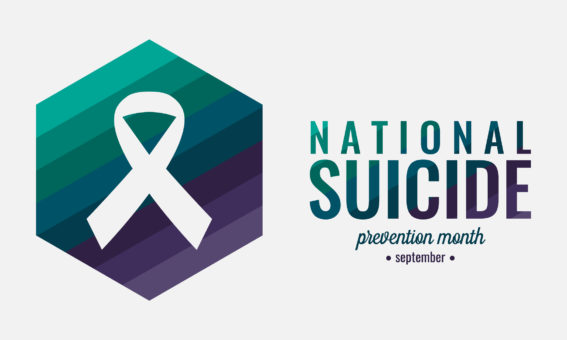September is National Suicide Prevention Awareness month, a time where communities can come together and share their stories and resources to help spread awareness about suicide in the hope of preventing another individual from taking his/her life. According to the Center for Disease Control (CDC), more than 41,000 individuals die by suicide each year, making suicide the 10th leading cause of death among adults in the United States and the second leading cause of death among individuals 10-24 years of age. Firearms account for 50% of suicide and women attempt suicide three times more frequently than men; however, men are three times more likely to die by suicide. Suicide is highly linked to mental health disorders such as anxiety, bipolar disorder, and depression and also affects individuals who are struggling with a substance abuse disorder or an eating disorder. Preventing and treating mental illness is the first line of defense in preventing suicide.
Suicidal warning signs
Warning signs that a loved one might be depressed or suicidal include:
- Frequently talking about self-harming behavior and suicide, or portraying themselves in a negative light.
- Distancing themselves emotionally from loved ones.
- A loss of interest in activities that once brought them joy, such as playing sports, participating in hobbies, and spending time with friends.
- Unpredictable changes in eating or sleeping habits, often accompanied by neglecting personal hygiene.
- Desperate attempts to regain lost friends, such as succumbing to peer pressure to engage in unhealthy habits such as drug use.
- A decline in school or work performance
- Buying a gun or weapon
- Asking questions associated with death and/or suicide
- Giving away prized belongings
Why suicide?
Many individuals often ask themselves, “Why would someone commit suicide?” “Isn’t that a selfish way to solve problems?” “Can’t they just get over whatever it is they are going through?” Unfortunately, individuals who have not personally struggled with a mental health disorder may have a hard time understanding why an individual would take their own life, and it may be impossible to put themselves in someone else’s shoes. It is crucial, however, to understand that regardless of the reason behind the suicidal ideations and attempts, the individual is genuinely struggling with deep-rooted emotional pain that may go beyond “snapping out of it.” The individual may be ashamed to ask for help, may not have a support system to be able to receive help or maybe too scared that finances could get in the way. As a family member, friend, coworker or loved one, it is imperative that we take our time to listen to individuals who are struggling and try to steer them in the right direction to receive professional help. Understanding the underlying reason these suicidal ideations are occurring, is essential to learn how to overcomes this particular struggle and develop healthy coping skills to combat and future setbacks.
Establishing a positive support system
Having a close friend, spouse, or family member who you can trust is imperative to share thoughts and feelings that are occurring. Suicide is attached to a harsh stigma, and the only way to break that stigma is to share the truth. If you know someone who is potentially suicidal, make sure that they know they can reach out to you and talk to you about what is going on. Make sure that you are actively and openly listening and not arguing or sharing your view.
Protective factors for suicide prevention
- Skills in problem-solving, conflict resolution, and nonviolent ways of handling disputes
- Effective clinical care for mental, physical, and substance abuse disorders
- Easy access to various clinical interventions and support
- Family and community support (connectedness)
- Cultural or religious beliefs that discourage suicide and support seeking help
Crisis hotlines
- 1-800-273 TALK (8255)
- Text NAMI to 741-741
- 911
- Suicide prevention lifeline
- Veterans crisis hotline
- Send a text to 838255
